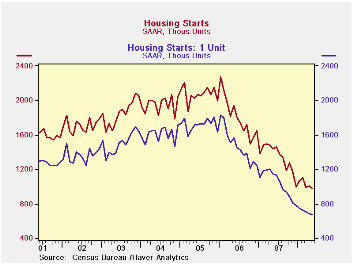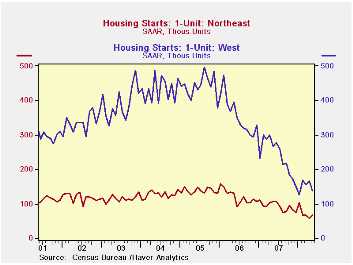 Global| Jun 17 2008
Global| Jun 17 2008U.S. Housing Starts Lowest Since 1991
by:Tom Moeller
|in:Economy in Brief
Summary
Housing starts fell slightly more-than-expected last month. The 3.3% m/m decline to 975,000 units (AR) was from a downwardly revised 1,008 units in April. The latest level was the lowest since January 1991 and Consensus expectations [...]

Housing starts fell slightly more-than-expected last month. The 3.3% m/m decline to 975,000 units (AR) was from a downwardly revised 1,008 units in April. The latest level was the lowest since January 1991 and Consensus expectations had been for 980,000 starts in May.
Single-family starts continued weak and fell 1.0% from April to 674,000, also the lowest since 1991. So far 2Q starts are down at a 25% annual rate from 1Q.
By region the decline in single-family starts was led last month by an 18.0% (-48.7% y/y) drop in the West. Elsewhere in the country, starts rose. In the Northeast single-family starts rose 11.9% (-38.3% y/y) and made up all of the prior month's decline. In the Midwest starts rose 5.7% (-42.8% y/y) to the highest level since January. Finally, single-family starts in the South ticked up just 2.9% (-37.7% y/y) and made up nearly half of the decline in April.
Multi-family starts last month declined 8.0% and reversed half of the April increase.
Building permits slipped 1.3% after a 5.4% rise during April. Single-family permits fell 4.0% to a new low for this cycle.
Inflation and the Size of Government from the Federal Reserve Bank of St. Louis is available here
| Housing Starts (000s, AR) | May | April | Y/Y | 2007 | 2006 | 2005 |
|---|---|---|---|---|---|---|
| Total | 975 | 1,008 | -32.1% | 1,344 | 1,812 | 2,073 |
| Single-Family | 674 | 681 | -41.2% | 1,039 | 1,474 | 1,719 |
| Multi-Family | 301 | 327 | 3.8% | 304 | 338 | 354 |
| Building Permits | 969 | 982 | -36.3% | 1,371 | 1,842 | 2,159 |
Tom Moeller
AuthorMore in Author Profile »Prior to joining Haver Analytics in 2000, Mr. Moeller worked as the Economist at Chancellor Capital Management from 1985 to 1999. There, he developed comprehensive economic forecasts and interpreted economic data for equity and fixed income portfolio managers. Also at Chancellor, Mr. Moeller worked as an equity analyst and was responsible for researching and rating companies in the economically sensitive automobile and housing industries for investment in Chancellor’s equity portfolio. Prior to joining Chancellor, Mr. Moeller was an Economist at Citibank from 1979 to 1984. He also analyzed pricing behavior in the metals industry for the Council on Wage and Price Stability in Washington, D.C. In 1999, Mr. Moeller received the award for most accurate forecast from the Forecasters' Club of New York. From 1990 to 1992 he was President of the New York Association for Business Economists. Mr. Moeller earned an M.B.A. in Finance from Fordham University, where he graduated in 1987. He holds a Bachelor of Arts in Economics from George Washington University.
More Economy in Brief
 Global| Feb 05 2026
Global| Feb 05 2026Charts of the Week: Balanced Policy, Resilient Data and AI Narratives
by:Andrew Cates






